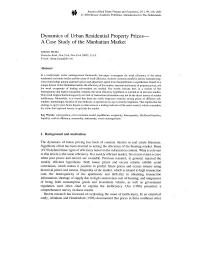Abstract: In a multivariate vector of autoregression framework, this article investigates the weak efficiency of the urban residential real estate market and the cause of weak efficiency. An error correction model is used to estimate long-term relationships among apartment prices and adjustment speed from disequilibrium to equilibrium. Based on a unique dataset of the Manhattan market, the efficiency of this market, seasonal stationarity of property prices, and the weak exogeneity of leading sub-markets are studied. Our results indicate that, in a market of less heterogeneity, and higher transaction volumes, the weak efficiency hypothesis is rejected as in previous studies. This result implies that heterogeneity and lack of transaction information may not be the direct source of market inefficiency. Meanwhile, it is found that there are stable long-term relations among prices of different sub-markets. Interestingly, the price of one-bedroom co-op is weakly exogenous. This implies that the starting co-op for most home buyers in urban areas is a leading indicator of the entire market which contradicts the claim that high-end luxury co-op leads the market.


